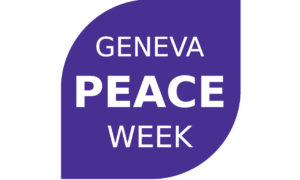Événement Virtuel
Geneva Peace Week | GPW20
Geneva Peace Week (GPW) is a leading annual forum in the international peacebuilding calendar, and the flagship event of the Geneva Peacebuilding Platform. This year, the thematic focus of the week is "Rebuilding trust after disruption: Pathways to reset international cooperation".
Find here a selection of sessions discussing environmental-related issues taking place during Geneva Peace Week. Friday 6 November is the International Day for Preventing the Exploitation of the Environment in War and Armed Conflict. For the occasion, the final day of Geneva Peace Week will be devoted entirely to to innovations, conversations, and solutions in environmental peacebuilding.
Wednesday
- Transboundary Water Resources Management: Challenges and Opportunities | 4 November 10:00 – 10:50
The session will explore the opportunities and challenges of transboundary water management, drawing on the good practices of cooperative arrangements including in the Senegal and Danube basins. Based on this, it will develop lessons learnt that could inform cooperation in the Blue Nile basin.
Friday (International Day for Preventing the Exploitation of the Environment in War and Armed Conflict 2020)
- Peacebuilding Disrupted by Covid19 and Climate Change in the Global South– Perspectives from Faith-based Actors | Lutheran World Federation and the World Council of Churches | 6 November 9:00 – 10:00
This session will highlight the impact of climate change and the current pandemic revealing not only the diminished the capacity of states with fragile institutions, but also the risks posed to faith-based actors in peacebuilding and conflict prevention.
- Reaching environmental defenders in peace-building | Earthjustice and University of Geneva – Institute for Environmental Science | 6 November 9:00 – 10:00
While the environmental dimension is growing in peacebuilding actions, addressing the needs and rights of environmental defenders remains marginal. Environmental defenders have been clearly identified as victims of human rights violations and violence, often intensifying in conflict situations.
- Monthly Environment, Climate, Conflict, and Peace (ECCP) Meeting | Geneva Peacebuilding Platform | 6 November 10:15 – 11:15
This session is a monthly meeting of the Geneva Dialogue on Environment, Climate, Conflict, and Peace, aiming to improve and expand the reach of both peacebuilding projects towards environmental and climate sensitivity, and also environmental and climate projects towards peacebuilding sensitivity.
- Cutting Edge Science in the Service of Peace Building, in a Pivotal Moment for the Survival of our Planet | 3Dlexia Cosmos, Ministry of Education of Tucuman and Argentina/Biopolitics International Organisation BIO | 6 November 11:30 – 12:30
The purpose of this session will be to explore ways by which scientific knowledge and innovative education can contribute to better understanding of global challenges and influence world leaders on how to join forces in international peace building.
- Exploring case-studies of environmental peacebuilding in Kenya, Nepal and Nigeria | Initiatives of Change (IofC) Switzerland and the Geneva Centre for Security Policy (GCSP) | 6 November 11:30 – 12:30
This session will explore how and why environmental challenges can give rise to both conflict and collaboration, how farmer-managed natural regeneration is fostering collaboration in Kenya, how conflict management skills and public discourse mechanisms are enabling local actors to lead resilience-building efforts in Nepal, and discuss the case of Akassa Island, in Nigeria, where peacebuilding and participatory natural resource management are having synergistic benefits.
- Intergenerational Dialogue on the Role of Water in Environmental Peacebuilding | Geneva Water Hub/University of Geneva, the International Secretariat for Water, the Environmental Peacebuilding Association and the World Youth Parliament for Water | 6 November 12:45 – 13:45
The session will highlight the role of water as an instrument of peace and how young generations from local communities drive peace and cooperation. - Conservation and peacebuilding: Towards greater collaboration | PeaceNexus Foundation, the International Union for Conservation of Nature (IUCN), the World Wildlife Fund (WWF) and Conservation International | 6 November 12:45 – 13:45
This session aims to provide insights into how the conservation and peacebuilding communities could work together more closely and better learn from each other to address both conservation and peacebuilding challenges. - Peace and climate action: challenges and opportunities from Latin America | Latin American Network Initiative, the Environmental Committee (GISA), the Quaker United Nations Office (QUNO) and PeaceNexus Foundation | 6 November 14:00 – 15:15
This session will explore local, national and international perceptions and practices in relation to climate action, with a regional focus on Latin America. - Beyond water: Science Diplomacy for Local Conflict Prevention | UNESCO-SIMEV Chair, UNESCO Hydropolitics Chair, CLINGENDAEL – The Netherlands Institute of International Relations, and Montpellier UNESCO International Water Centre | 6 November 14:00 – 15:15
This session will explore how scientific organisations can intervene as science diplomats on the ground. By reflecting on three projects implemented in Morocco, Senegal and Burkina Faso, and with a variety of actors – from researchers and practitioners to politicians and entrepreneurs, it will show how science can foster sustainable cooperation and serve as catalyst for peace.
- Geneva Peace Week Closing Ceremony | Geneva Peacebuilding Platform | 6 November 15:30 – 17:00
The ceremony will range from Geneva to the international levels and feature global thought leaders, technical experts, and peacebuilders in their own communities. The closing ceremony aims to focus the conversation on impact and policy, pushing the collective community of practice towards what comes next.

